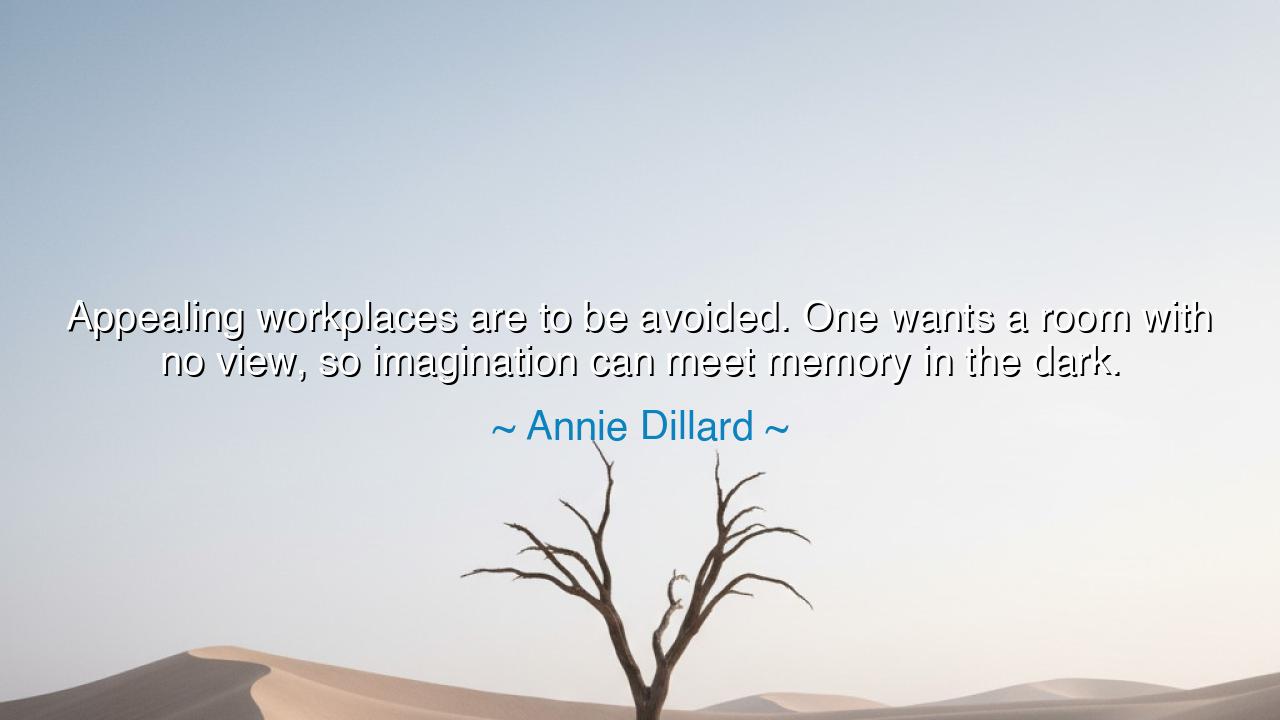
Appealing workplaces are to be avoided. One wants a room with no
Appealing workplaces are to be avoided. One wants a room with no view, so imagination can meet memory in the dark.






In the haunting and luminous words of Annie Dillard, the mystic observer of nature and spirit, we are given a paradox that shimmers with ancient wisdom: “Appealing workplaces are to be avoided. One wants a room with no view, so imagination can meet memory in the dark.” In these few lines, she reveals a truth that artists, philosophers, and seekers have known since time began — that true creation is not born from comfort or distraction, but from stillness, solitude, and the deep conversation between imagination and memory. She teaches that when the outer world grows quiet, the inner one awakens, and from that darkness, the light of creation begins to burn.
To desire an “appealing workplace” is natural to the restless body, for beauty pleases the eye and stirs a shallow joy. Yet, Dillard warns, such beauty can become a trap. When the gaze is outward, the soul forgets to look within. The poet cannot serve two masters — the world and the word — at the same time. The true artist must sometimes turn away from the glittering distractions of sight and sound, retreating instead into the humble room with no view, where silence reigns and the only horizon is the mind’s own edge. It is in that inner night that imagination and memory — the twin architects of creativity — begin their sacred work.
The origin of this insight lies in Dillard’s own discipline as a writer. Known for her solitude, she often sought small, bare spaces — not as punishment, but as invitation. She understood that imagination, to flourish, must feed upon the raw material of memory, untainted by the noise of the present. A window to the outside world may delight the senses, but it tempts the creator away from contemplation. In darkness, however, the past rises like a tide. Forgotten moments, dreams, griefs, and glimpses of wonder return to the mind’s stage, where imagination reshapes them into art, insight, and truth. Thus, the darkness is not a void, but a womb — the place where thought takes form.
History, too, whispers the same lesson. The philosopher Pythagoras required his students to sit in silence and darkness before they were permitted to speak. The prophet Muhammad received his revelations in the solitude of a mountain cave. The composer Beethoven, deaf and half-blind, created his greatest symphonies not from what he could hear or see, but from the resonances that stirred within him. In their isolation, these souls discovered that creation does not depend upon the outer world, but upon the meeting of memory — what has been lived — and imagination — what might yet be. When these two forces embrace, revelation is born.
Dillard’s “room with no view” is, therefore, a metaphor for the inner chamber of the mind — that sacred place where one must go alone. It is the space where distractions die and truth begins to whisper. In such solitude, the heart becomes its own landscape. There, the artist and the thinker learn that imagination is not escape, but transformation — the alchemy that turns the lead of experience into the gold of meaning. The room may be dark, but the soul within it becomes luminous.
This teaching challenges the modern soul, surrounded as it is by noise and abundance. Today, every room has too many windows — windows of glass, of screens, of endless connection. The world floods our senses and leaves us starving for silence. Dillard’s wisdom calls us back to simplicity, to the discipline of withdrawal. For only when the eyes rest can the mind awaken; only when the world fades can the inner world rise. To create, to understand, to remember — one must learn to dwell, for a time, in darkness.
So, my child, take this truth as your own: do not fear the quiet room, nor the absence of comfort. Seek, instead, the space where nothing distracts and nothing flatters. There, let imagination and memory meet — not as strangers, but as lovers long parted, reuniting in the stillness to conceive something eternal. Close your eyes, and you will see more clearly. Turn from the world for a moment, and you will begin to find your voice.
For as Annie Dillard reminds us, the true work of creation does not take place beneath bright light or open sky. It is born in secret, in solitude, in that sacred darkness where thought becomes form, and the soul learns once more to see by its own light.






AAdministratorAdministrator
Welcome, honored guests. Please leave a comment, we will respond soon